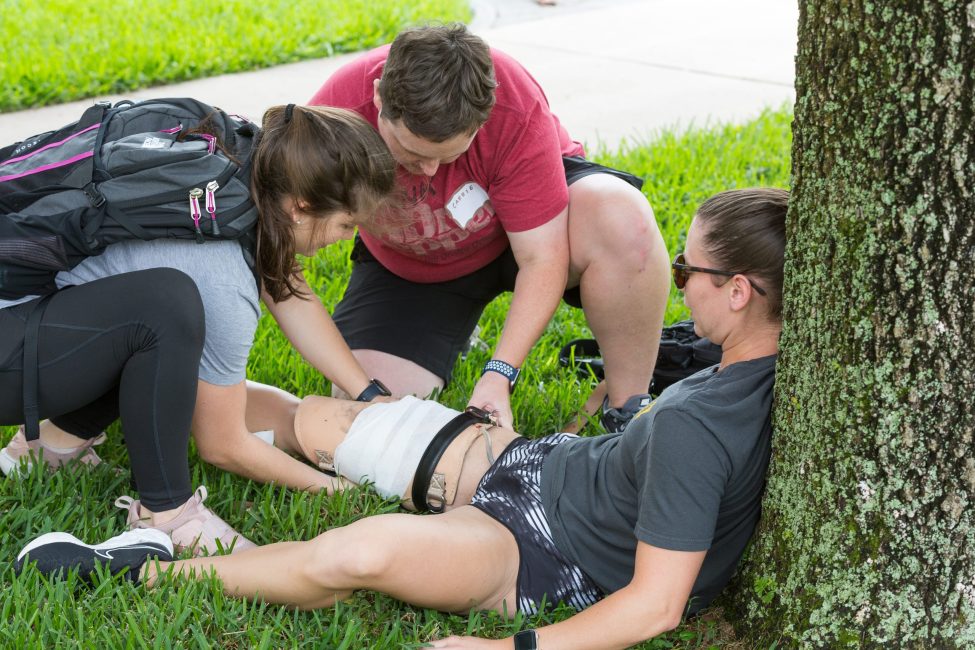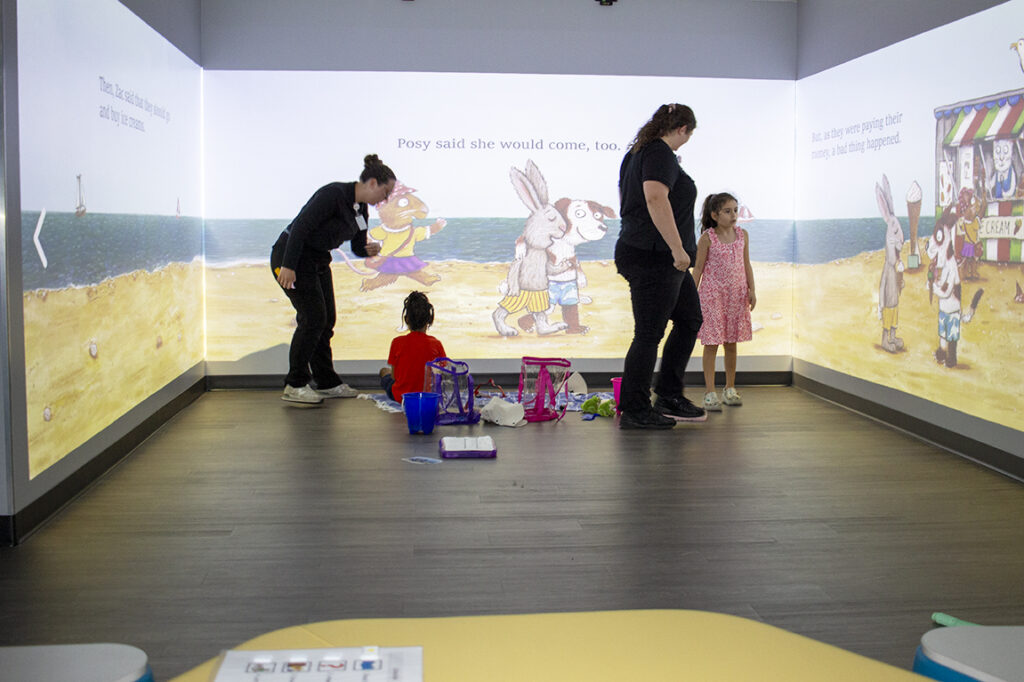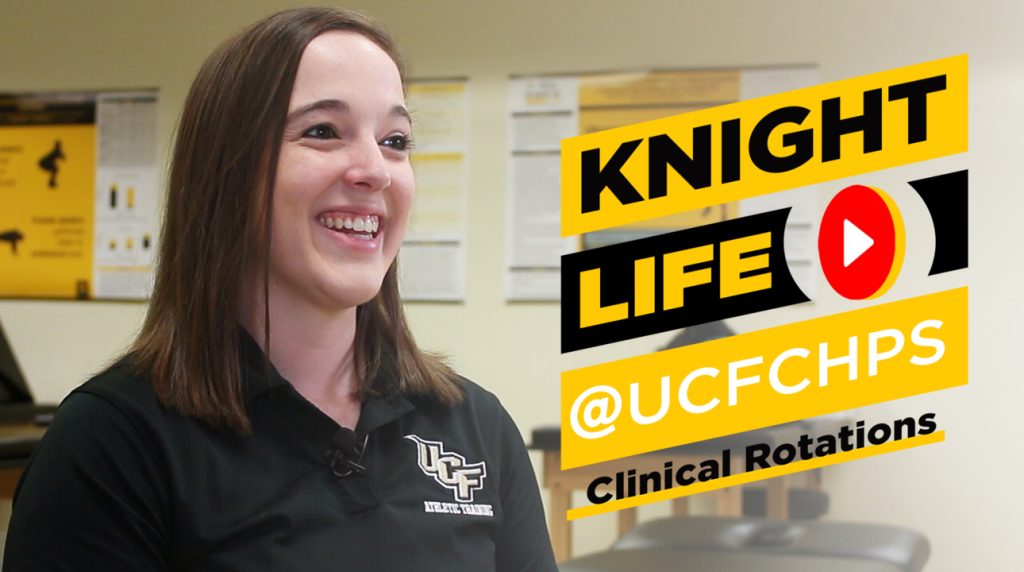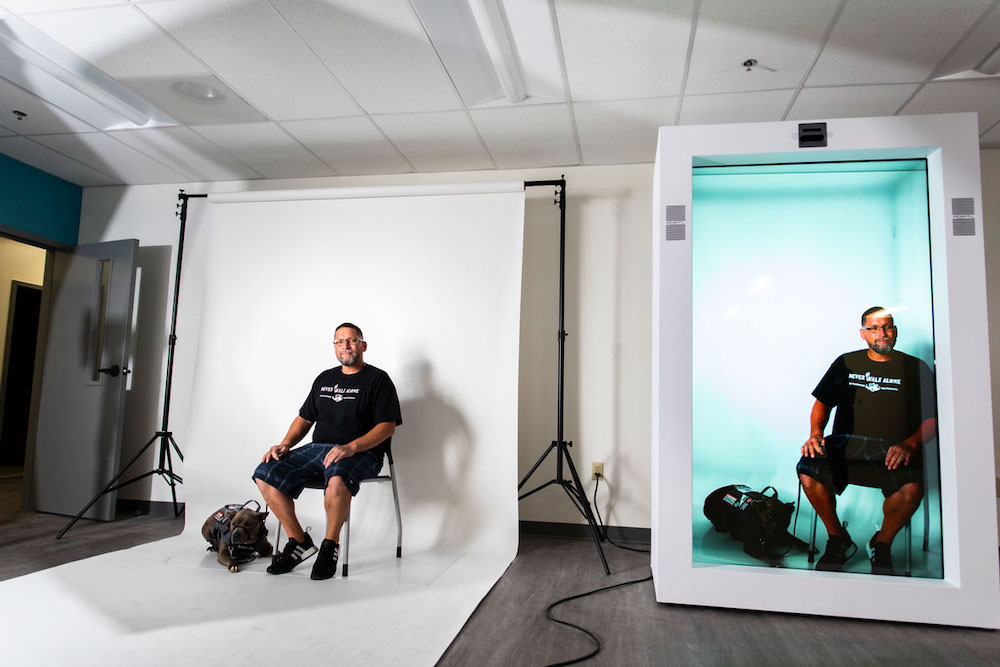Students in the master of athletic training program teamed up with licensed athletic trainers in the community for a hyper-realistic emergency training simulation event to enhance their first responder skills. With more catastrophic events occurring at mass gatherings like sporting events, ATs are among the first responders who provide life-saving care.
The event was in partnership with Extreme Simulations, which provided the technology, manikins and prosthetics, and was facilitated by a national expert in sports emergency training, Darryl Conway from Sports Emergency Management. The “fake” event had real learning outcomes for all learners involved.
The event on May 21 was geared toward current students in the Master of Athletic Training program, as well as licensed athletic trainers in the community who either graduated from UCF or host UCF students on internship. The event allowed the licensed professionals to earn continuing education credit. In addition to these learners, undergraduate students who are interested in the profession were able to attend as spectators.
Extreme Simulations contributed state-of-the-art technology, stage make-up and prosthetics, similar to what’s used in major films to make the training feel like real life. The company has experience training military personnel in both the U.S. and Israeli armies. This event allowed the company to explore trainings in the civilian space. The set up included fallen tree limbs, smells that simulated smoke from a fire and students who volunteered as actors portraying the patients. Darryl Conway, who trains athletic trainers nationwide through his organization Sports Emergency Management, joined UCF AT faculty member Carlos Gual, for pre- and post-event training with the participants focused on not only managing injuries, but also how to manage the crowd and chaos.
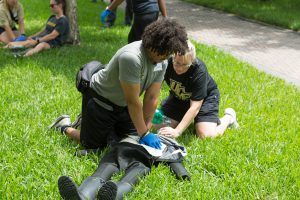 For the mock event, participants were given a scenario of an outdoor sporting event that was suddenly caught in a supercell storm, with strong lightning and winds that created mass chaos and injuries due to the dangerous environment and panic that ensued. Within the event, participants were challenged with scenarios including open wounds with a bone fracture, burns, panic attacks, cardiac events and multiple lacerations with active bleeds. The simulations were responsive to the participants’ actions, including prosthetics with simulated blood that would only stop bleeding once a torniquet was properly applied.
For the mock event, participants were given a scenario of an outdoor sporting event that was suddenly caught in a supercell storm, with strong lightning and winds that created mass chaos and injuries due to the dangerous environment and panic that ensued. Within the event, participants were challenged with scenarios including open wounds with a bone fracture, burns, panic attacks, cardiac events and multiple lacerations with active bleeds. The simulations were responsive to the participants’ actions, including prosthetics with simulated blood that would only stop bleeding once a torniquet was properly applied.
As seen in recent events such as the Boston Marathon bombings, athletic trainers are among the first on the scene at athletic events with the skills to help triage patients and save lives. It’s difficult to prepare ATs for these unforeseeable events and the panic that often ensues. Training events like this aim to close that gap and better prepare these medical professionals.
“While AT’s training mostly involves the active population, the skills to manage critical incidents translate directly to car/home accidents and mass casualty situations,” says Gual, who helped coordinate this event. “Our goal was to set the standard on how athletic trainers should prepare for critical events.”
Despite participants knowing what they are in for when participating in simulation training events, it’s still the best way to test first responder skills. “High quality simulation is essential to maintaining a high level of preparation and proficiency in all aspects of immediate and emergency care,” says Conway, who trains ATs affiliated with professional sports teams nationally. “As athletic trainers, we must participate in hands-on, practical, and scenario-based simulation that is venue, setting, and personnel specific. Trainings like this provide a super-realistic scenario and challenge and stress clinicians to perform the skills flawlessly.”
After the event, participants received feedback about how they did, tips on how to recover from the emotional and physical stress, and how they can better prepare. Participants say the training was beneficial and even seasoned professionals had their skills challenged.
“I pray that I will never need to use these skills, but feel better prepared to act in a critical incident should I have to,” says Stephanie Lennon who attended the event and currently serves as a preceptor for students in the athletic training program.
This new level of hyper-realism in emergency medical response training reflects the innovative new ways that technology is being used to educate future healthcare providers.
“Simulation technology has leaped forward in the last five years with hundreds of solutions in different segments,” says Oriel Herman from Extreme Simulations. “Fifty years ago, medical simulation was limited to simple rubber CPR manikins. With today’s technology, students are provided with a real hands-on experience in immersive environments. From realistic manikins and task trainers to a highly effective mobile training units and immersive touch screen rooms, this is no doubt a great moment in time for sim tech.”
Leaders in the UCF College of Health Professions and Sciences hope to expand this kind of training event in future years and involve even more healthcare professions.
“This is the future of training our medical professionals for those unforeseeable tragic events that unfortunately we are seeing more and more of in today’s world,” says Bari Hoffman, associate dean of clinical education for the College of Health Professions and Sciences. “This kind of high-tech simulation is an impactful way to prepare our students, testing their hard and soft skills in response to high stress scenarios. We look forward to better ingraining such innovative trainings into our programs.”
